
It pays to be original and creative when designing a game. Innovation is key in a free market, and when a new game console comes out, having something totally new and different is a sure way to get noticed. It can be especially tough these days with the cost of game development skyrocketing, so being economical is what ultimately counts.
Housemarque is a small developer hailing from Finland. They have been around since the mid 90s, and have stayed under the radar and remained relevant thanks to their consistent output of modest 2D action games and shooters. While not exactly an up and comer, Housemarque has the experience to deliver a polished and slick looking first party action game.
Titles like Dead Nation and Resogun is what most gamers would know them for, and with Returnal these Fins bring their panache for arcade like action to a full-blown third person shooter with a twist. It’s Housemarque’s most ambitious they have ever produced, and is backed by big Sony dollars. This is the game that has to get people willing to pay scalpers for a PlayStation 5. Does it succeed, or just suck?
Returnal
Developer: Housemarque
Publisher: Sony Interactive Entertainment
Platforms: PlayStation 5
Release Date: April 30, 2021
Players: 1
Price: $69.99
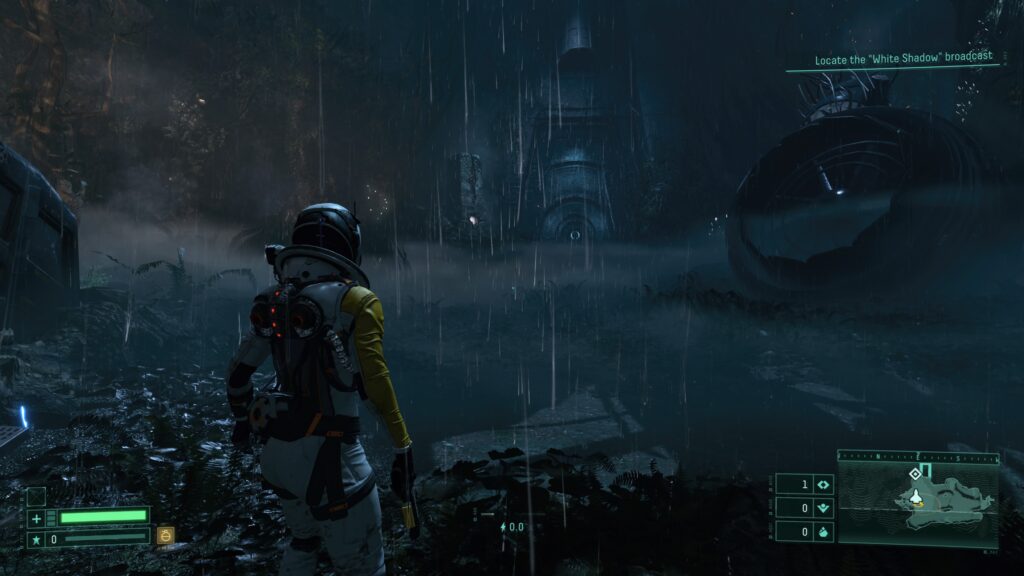
When Returnal was first revealed during E3 2020, it was easy to dismiss. The marketing made it resemble a pretentious story driven over the shoulder walking sim, with a haggard looking female protagonist who is as easy on the eyes as wiping tears with sand paper.
There is no mistaking the direction that Sony has taken in the past few years. The closure of Japan Studio and moving their HQ to California was a sign that the future products of the once venerable juggernaut to Nintendo; has aligned themselves with professional victims and multi-colored hair degenerates who hate video games and can’t stand to see regular people having fun.
Miraculously, Returnal is very fun. Despite its appearances; this is a hardcore, fast paced action game, that has brain melting visuals and incredible gameplay. There is even a compelling, unintrusive narrative that tells an original story, focuses on psychological horror, and is steeped with incredibly nihilistic implications.
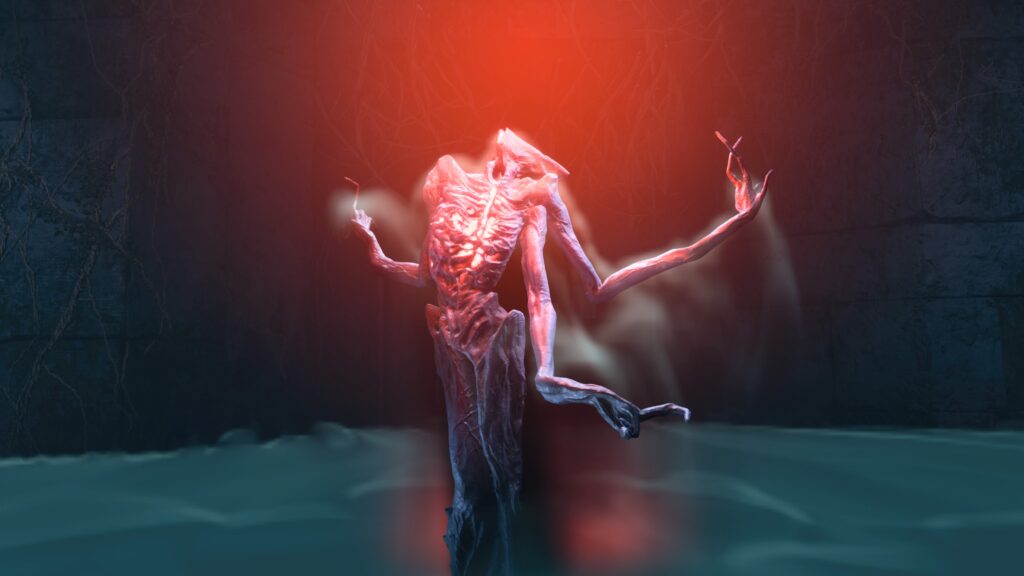
Selene is an astronaut and she has a problem. During a mission, she crashes her space craft on an alien planet (naturally), and she finds herself trapped in a terrible Groundhog Day style loop. Planet Atropos is extremely hostile, and Selene has only her sidearm to ensure survivability. It does not take a lot before she is sent up the river Styx.
Death is something Selene will become closely acquainted with as she tries to make progress exploring Atropos. Insane and feral aliens that defy description will smash, shred, or melt her. If the indigenous life or ancient mechanisms don’t kill her, then the tricky traps and perilous platforms will.
Dying will have her wake up as her ship, the Helios, comes crashing down on the Atropos surface again. As if being cursed wasn’t enough, the planet seemingly has a mind of its own, and is constantly shifting. It’s as if every time Selene perishes, her remains are absorbed by Atropos, and it begins to manifest some of her characteristics and elements from her memories.
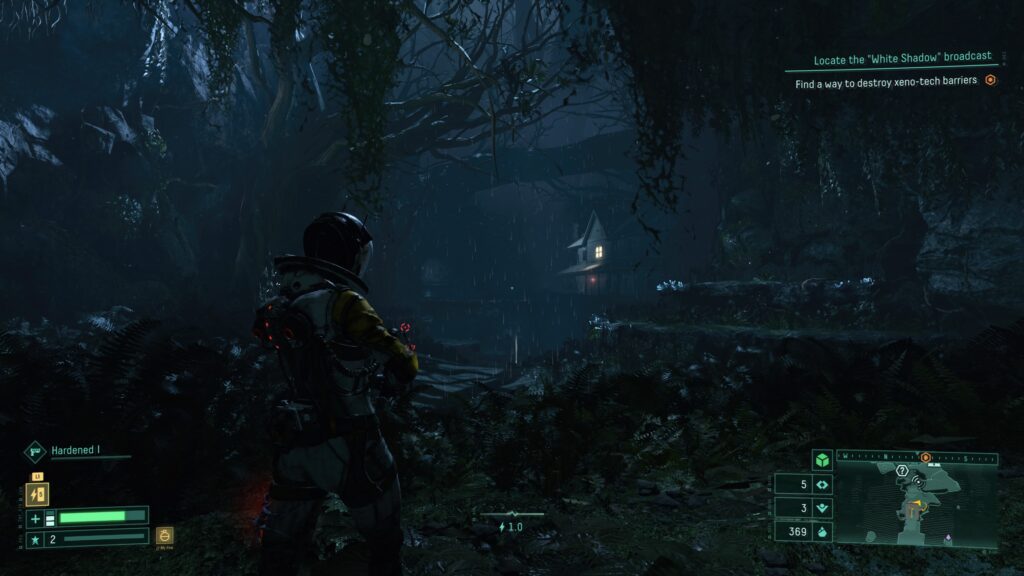
Returnal is full of amusing and layered symbolism. Anyone who is familiar with Greek would get a kick out of the naming of the concepts in the story. Atropos is named after one of the three fates, who would decide who lived and who died by cutting a thread of life. Poetically ironic that this is the place where Selene is doomed to exist for eternity.
Dying and trying to scrounge around for resources is Returnal‘s “rogue” element. Theoretically, this would promise extremely varied gameplay, and keep players on their toes. Regretfully, this is a false-promise that has its seams glaring like painfully obvious stubble on a transsexual.
No matter how hard you try to be nice and accept Returnal for what it is, the nagging feeling in the back of your head cannot be ignored. The rogue gameplay is tacked-on, and artificially pads out the game’s length by forcing players to start from the beginning, while losing most upgrades.
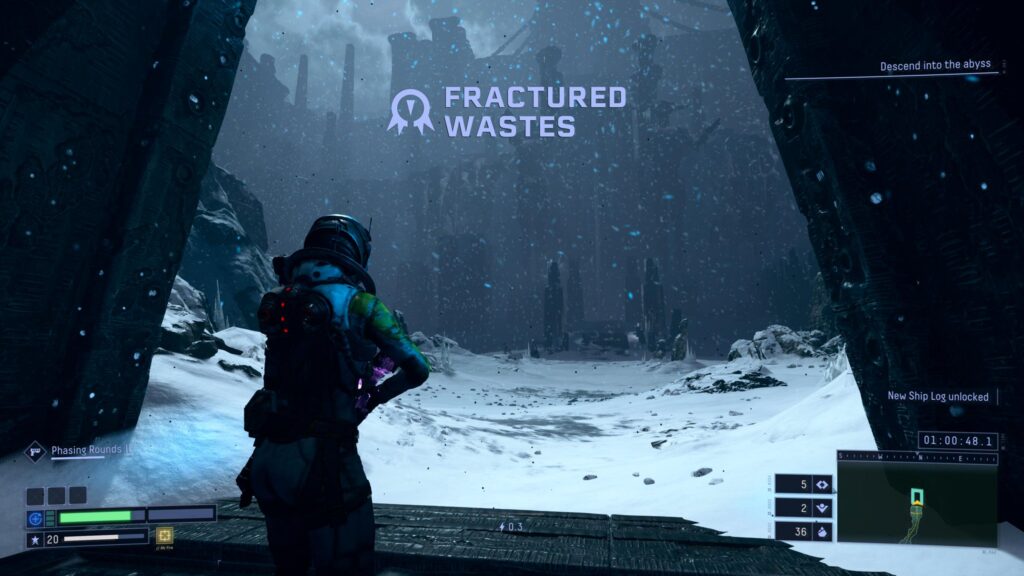
Each biome in Returnal is made up of many carefully designed arenas or rooms that vary in size and layout. They are all connected in a byzantine Metroid Prime-esque style, and with every death the entire map layout is reshuffled- using the same premade arenas and rooms.
At first the experience is riveting and surprising, but after a while it becomes routine and less interesting than if the rooms were connected in a thoughtful manner that could tell a story. Returnal would have made for an excellent Metroidvania if it weren’t for the rogue mechanics.
Inevitably, Selene is going to get a bad run due to the RNG. High-powered enemies could be spawned in a treasure room, and it could be right outside of her crash site where she is woefully ill-equipped to confront its ravenous maw. It’s as if the game is giving the player a proverbial swift kick in the groin, and then asking if you would care for another.
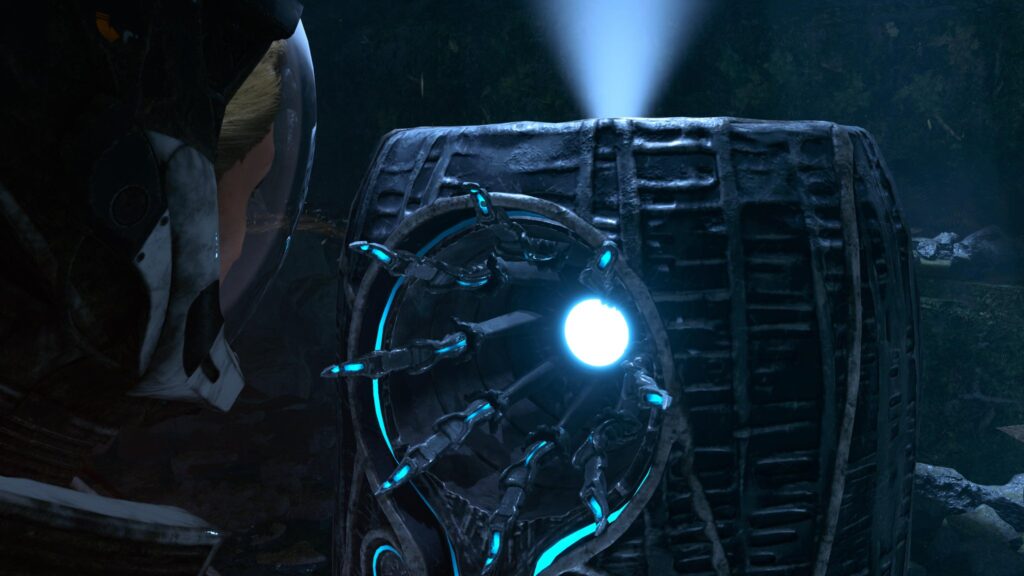
Selene is able to only carry a single weapon, and it’s totally random to what she may find. Upgrades and various boons always are randomly dropped, or can be found while exploring the biomes. The designers found a way to add an extra layer of gamble, with risky upgrades that have a potential to corrupt Selene’s suit.
Either in the form of cancerous biotech or parasites, there are all kinds of unusual buffs and useful abilities that can come at a cost. What Returnal does to make them enticing is that the corruption can be overcome by completing a side objective, or using acquired ether to purify the upgrade.
Ether is one of the more valuable assets to acquire on Atropos. Along with the scant permanent upgrades that assist with traversal, ether is the only other pick-up that is not lost upon death. Compounded with its rarity, it’s a resource that can change the tides for Selene’s eternal torment, should players dare to spend it.
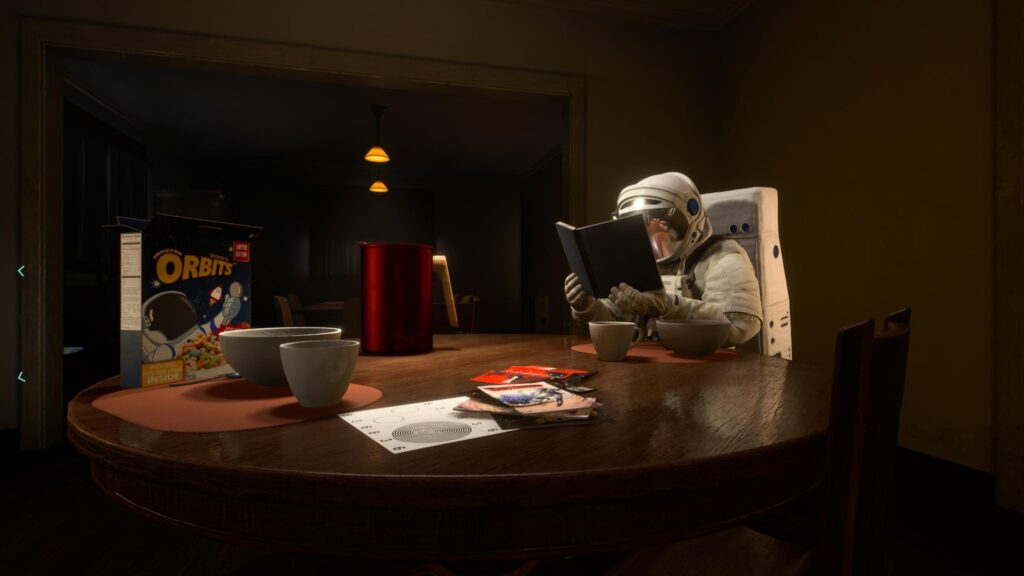
Returnal can truly feel like an intense survival-horror experience. The surreal alien designs and landscapes are flawlessly realized. Everything feels like it breathes and is fully animated, looking like a living thing that defies human understanding.
H.R. Giger and Doom (2016) are undeniably influences on much of the visual flair seen in Returnal. The sights and sounds can often seem hellish and nightmare-like. Atmosphere is dense, the air always looks thick and heavy; but magical at the same time due to the copious reliance on particle effects and bio-luminescence.
Selene’s playability is very fast and fluid. For a haggard looking Karen, she can really haul at some blazing speeds, and head-shot tentacle monsters like the Doom man. Controls are incredibly tight and fluid; on par with some of the best shooters from the eighth console generation.
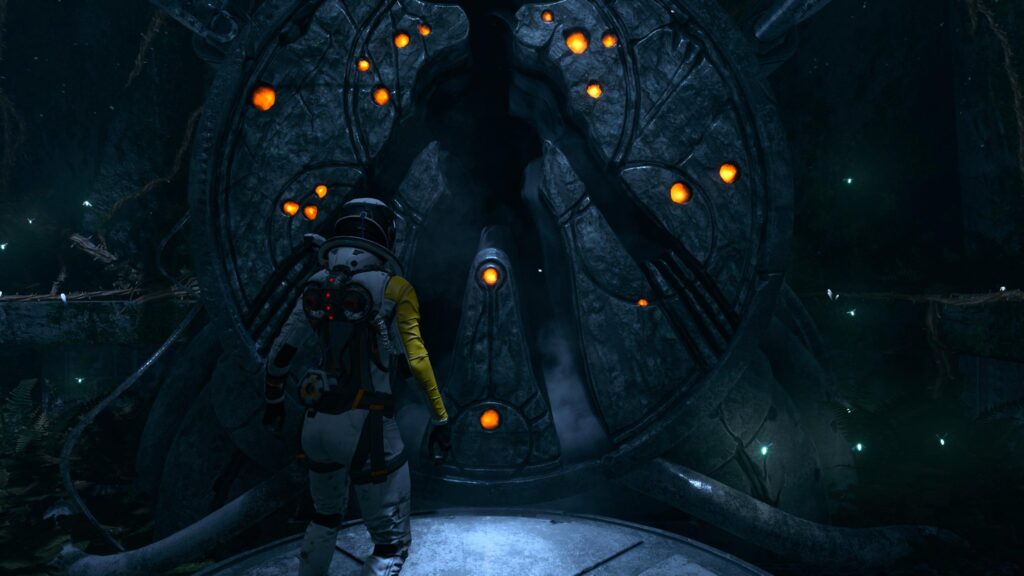
In battle, Selene can zip around the field and avoid huge curtains of bullets raining from all directions. The sight resembles the POV of a spaceship from shoot ’em up, as the waves of projectiles race towards the frumpy astronaut. Fans of boss fights from NieR: Automata will feel right at home in these skirmishes. Selene even gets a katana to dice up foes.
Most shocking of all is how challenging Returnal can be. Housemarque has a history of making arcade-like action games, and that ethos has carried over. If there was no rogue elements, this would have been a very short game. Thanks to the visceral and intense action, it would have been able to stand on its own… But then it would not be able to pass for a $69.99 title.
A special mention must be given to the PlayStation 5’s haptic triggers, and how Returnal makes use of them to add a unique feel to the gameplay.
Breaking through the tension to activate the secondary fire and unleash a devastating attack feels unlike anything from any other action game. It’s extra satisfying to feel the crunch of a violently vibrating controller, freaking out from all the fury being unleashed by alien weapons.

The sound design packs a heavy punch, and booms from a guttural alien bowel. The aliens have inhuman screeches and look the way the sound; organic and chaotic. Returnal is one of the most impressive sounding games, and a lot of it is due to the heavy synth bass and unconventional use of the speaker in the controller to give gunplay extra kick.
Returnal does make an excellent impression, and is legitimately hard to put down thanks to how the rogue elements keep things fresh; even if they pad out the length. What is especially frustrating is that there is no way to create a temporary save to call it a night, and resume the run at a later day.
For some reason, Housemarque is dead set on imposing this contrivance on all players to preserve the difficulty from PS+ users; preventing them from making back-up saves via the cloud. Everyone else who does not have the subscription has to suffer, and nobody suffers more than Returnal. If Hades permitted a continue option, why not this? Saving only occurs after dying.
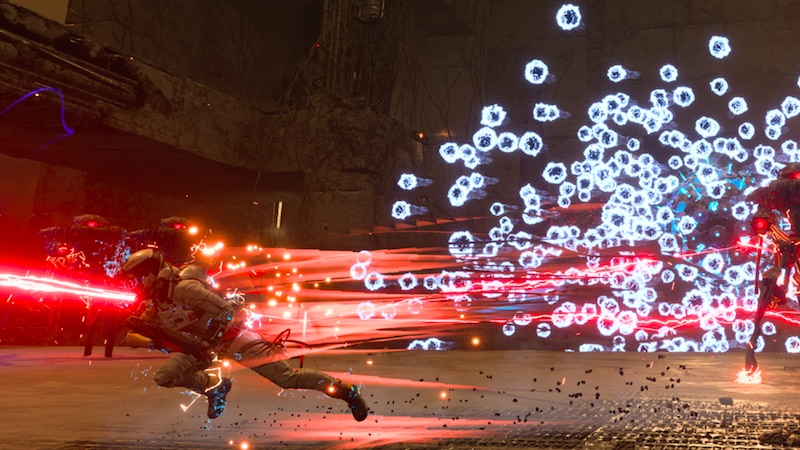
Returnal is an impressive display of what is in store for the PlayStation 5’s future. The visuals and fast paced, polished action is highly stimulating. There are no load times either; Selene dashes through maps with doors opening instantly without slowing her down. Pop-in never happens, and not a single instance of texture loading occurred, that would break immersion.
Replay value is high due to the addictive gameplay loop, and the quest for 100% and best ending will double the play-time past the initial credit roll. The only way that could have softened the arbitrary rogue elements would have been to ease up on the punishment for dying; maintaining the health upgrades would have been a fair compromise, and would have ensured a sense of progression after death.
It’s easy to misjudge Returnal as some kind of pretentious Sony story-driven drivel. The truth is that it’s a hardcore 3D action game that has more in common with Doom Eternal and Metroid Prime than anything Sony has ever made before. It does suck to lose almost everything and starting from the beginning, but sometimes that’s just the way it goes.
Returnal was reviewed on PlayStation 5 using a review copy purchased by Niche Gamer. You can find additional information about Niche Gamer’s review/ethics policy here.